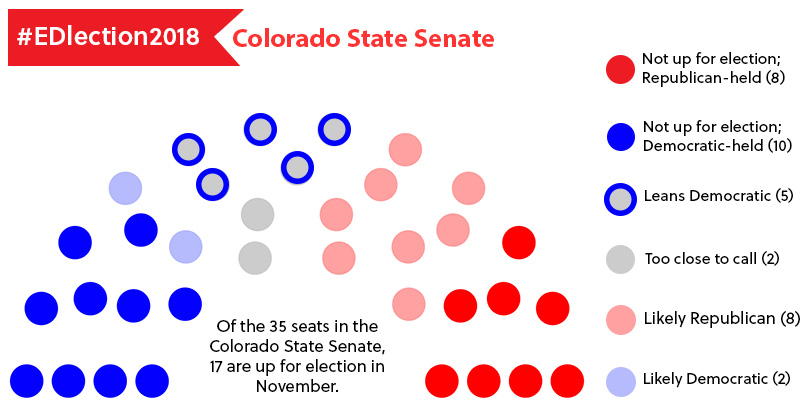Colorado Republicans Hold a One-Seat Majority in the State Senate. These Two Democrats Could Flip the Chamber — and Jump-Start State Education Reform

EDlection 2018: From coast to coast, The 74 is profiling a new education-oriented campaign each week. See all our recent profiles, previews, and reactions at The74Million.org/Election (and watch for our Election Night live blog Nov. 6)
Though it has historically been friendly territory for Republicans, Colorado has spent the past decade moving gradually to the left. Led by Democratic Gov. John Hickenlooper, the state has in recent years legalized and regulated marijuana, instituted strict new controls on gun access, and offered both driver’s licenses and in-state tuition at public college to illegal immigrants.
It’s a significant shift for a former bastion of Western political independence. From 1968 to 2004, Republican candidates carried Colorado in nine out of 10 presidential elections. Since then, powered by growing numbers of Latino and college-educated residents, Barack Obama and Hillary Clinton have both run up large victory margins in Denver and the surrounding suburbs.
Soon, Coloradans may have a chance to gift their electoral votes to one of their own. Hickenlooper, among the most popular governors in the country, is widely seen as preparing for a presidential run in 2020. To take his place, the Democrats nominated Jared Polis, a progressive congressman who has led in early head-to-head polling against his Republican opponent, State Treasurer Walker Stapleton. Their matchup will highlight big differences in the candidates’ views around school funding and early education.
But to complete Colorado’s transformation into a blue stronghold, Democrats are setting their sights on an even sweeter prize: unified control over the Denver statehouse, which can only be achieved by winning a majority in the state Senate. Flipping just one Republican-held seat in that body would allow them to shape every aspect of state governance, including education. And of the 17 Senate seats in contention this year, they’ll have two especially promising opportunities for takeover.
In Senate Districts 16 and 24, Democratic nominees Tammy Story and Faith Winter have been tipped by both local media and national political organs as the most likely contenders to upend Republican control over the Senate. In each district, GOP incumbents are competing on territory that Hillary Clinton won in 2016. And according to local political observers, the issue of education could help both women improve on Clinton’s performance.

“Clinton carried our state by just under six points, but at the end of the day, there wasn’t a clean sweep,” Republican pollster David Flaherty told The 74 in an interview. “…This race is more about hand-to-hand combat, and the wind is at the Democrats’ back. And when Republican candidates are not speaking to education or demonstrating it’s a priority to them, they’re putting themselves at risk.”
Story, a veteran education activist in one of the state’s largest school districts, lost a race for the General Assembly in 2016 by less than 2,000 votes. Winter, a state representative, is already seen as a rising star among Colorado Democrats. Both women have attracted national buzz as well: On Wednesday, their campaigns were among 81 nationwide to earn Obama’s endorsement.
Today I’m proud to endorse such a wide and impressive array of Democratic candidates – leaders as diverse, patriotic, and big-hearted as the America they’re running to represent: pic.twitter.com/gWzalQhFas
— Barack Obama (@BarackObama) August 1, 2018

If one or both succeed in unseating their Republican opponents — national election watchers have declared the fight for the Senate a toss-up — they could help their party attain control over Colorado’s governorship and both houses of its state legislature, known as a “trifecta.”
That would be important news for the Democrats, who have fallen badly behind in state-level races over the past decade. Currently, just eight states (Connecticut, Rhode Island, Delaware, New Jersey, Washington, Oregon, California, and Hawaii) are home to Democratic trifectas, and even that number was only achieved after big gains in 2017’s off-year elections. By contrast, Republicans hold total sway over policy in 26 states, including huge population centers like Texas, Florida, and Ohio.
The district-by-district campaign for the state Senate won’t garner as much attention as the race to succeed Hickenlooper, but it could be just as important in deciding Colorado’s education agenda from 2019 onward. Polis would be the most stridently liberal governor in state history, while Stapleton broadcast his Trumpist bona fides to make it through the GOP primary; ultimately, though, neither man will breathe easily as governor with at least one chamber of the Colorado General Assembly pushing back against his initiatives.
‘A Very Dark Day’
Over the past decade of Democratic state leadership, Colorado has emerged as a model of center-left education reform, embracing charter schools and overhauling teacher evaluations without exploring private school vouchers or attacking teachers unions. Just last year, a bipartisan coalition in the legislature came together to pass a first-of-its-kind law requiring school districts to share revenue from local tax increases with charter schools.
Denver has led the way, fostering the growth of a “portfolio” district model that allows charter and district public schools to cooperate through pooled services. Both Colorado’s capital and its largest school district, the city has seen substantial improvement in student achievement while being rated tops in the country for school choice.
The Democratic reform consensus has also been good for the political fortunes of its architects. Former Denver superintendent Michael Bennet, who pushed through many of the district’s changes, has since become a U.S. senator; his erstwhile boss, Hickenlooper, moved from the Denver mayor’s office to the governor’s mansion (and now has his eyes on the White House).
But this spring’s gubernatorial primary showed that the era of good feelings around Colorado schools is likely over, and the race’s occasionally bitter rifts could hinder Democratic efforts to consolidate control over state government.
Three of the four major candidates — Polis, former state senator Mike Johnston, and Lt. Gov. Donna Lynne — aligned themselves with the education reform movement to one degree or another. But the Colorado Education Association, the state’s largest teachers union and a major force in statewide Democratic organizing, endorsed State Treasurer Cary Kennedy, who courted their favor by vowing to fight for traditional public schools.
The race descended into a proxy war over education when a group supporting Kennedy aired negative advertisements charging Polis with supporting private school vouchers and associating Johnston with “conservative anti-teacher laws.” Polis hit back with a commercial of his own, this one featuring a roomful of teachers scolding Kennedy.
Tensions exploded during the Democratic state assembly in April, where the most dedicated party activists gathered to select candidates to appear on June’s primary ballot. After lustily booing Jennifer Walmer, the head of the Colorado chapter of Democrats for Education Reform, party activists voted to include in their platform a (probably unenforceable) provision demanding that the group cease calling themselves Democrats.
The experience was searing, Walmer told The 74.
“As a native Coloradan, and as someone who’s worked in Democratic Party politics my entire life, it was a very dark day,” she said. “When people aren’t given the time to think and are presented with false choices, false information, false dichotomies — you know, ties between us and DeVos, or Trump — there is certainly, in that atmosphere, an opportunity for people to respond negatively.”
While those present at the state assembly voted overwhelmingly in Kennedy’s favor, the primary electorate had different ideas, backing Polis by a healthy margin. Still, Flaherty believes that residual wounds from the contest could damage Democratic legislative candidates.
“I was surprised by how much of a vicious reaction came from Cary Kennedy’s forces,” he said. “It really sort of sends the message, I think, that the traditional Democratic member is not willing to consider new ideas or challenge teachers unions, for good or bad. You know, ‘We’re not open for reform, and therefore, you’d better look elsewhere.’”
Stalled Agenda
The GOP has held a one-seat edge in the 35-member Colorado State Senate since 2014. Though small majorities like that are sometimes easier to splinter, the past two years have shown the strength of Republican resolve when confronted with liberal education initiatives.
Last year, the party shot down a bill to consider changes to the state’s school finance formula, which Democrats and many district superintendents say should be more equitable. They also killed an effort to provide greater funding to the state’s pre-K program, a major focus of Polis’s gubernatorial campaign. A proposed law to reform school discipline and curb student suspensions was another prominent casualty this April.
The typical approach has been to refer disfavored legislation to the State, Veterans, and Military Affairs Committee, where an incredible 86 percent of bills originating from the minority party have failed. The body has grown infamous as a “kill committee,” where Democratic measures stall without majority approval. Republican senators have also crafted their own doomed legislation, including a bill that would have allowed striking teachers to be jailed for contempt of court.
Flaherty said that proposal “could not be more tone-deaf and politically wrong to do,” adding that education “is just one of those issues where Republicans do not appear to be on the right side.” His Twitter warnings to fellow Republicans have begun to sound like doomsday prophecies, and he believes that if they don’t begin to focus more on schools, Democrats will be free next year to enact the full slate of items that have been bottled up previously.
“[Democrats] have a very good chance of having full control, so come January or into the next session, what will that mean? I fully expect a lot of those proposals to get green-lighted by Jared Polis, without question. I think you’re going to see education get a massive increase under a fully Democrat government in Colorado. I would expect a large amount of money to be reallocated.”
But to achieve its goals in 2019, Democrats have to improve on their legislative performance since 2014, when Republicans first established their current majority. Of the 17 seats that are being contested this year, 10 are occupied by Republicans, and in a year when anti-Trump winds are blowing strongly, Democrats are pushing their advantage by fielding candidates in every House and Senate race in the state. In Democratic primaries, progressives, and particularly progressive women, have come out ahead.
One of them is Rebecca Cranston, a nonprofit director who waged an underdog bid for her party’s nomination in the Republican-leaning Senate District 15. After edging out a respected and well-known local activist in the primary, she will now have to sell the district’s largely rural electorate on her candidacy.

Part of that effort will involve an appeal on behalf of rural schools. In many of the state’s more remote corners, cash-strapped school districts have resorted to operating on a four-day week. One recent study found higher juvenile crime rates in areas of the state with a truncated week.
“Children deserve quality education, and I believe that it needs to be equitable across the urban-rural divide,” Cranston told The 74. “There’s no reason why kids who grow up in rural counties should be getting any less quality education than any other kid in our state.”
Winning her election, and taking unified Democratic control over state government, would mean the opportunity to create better schools across the state, she added.
“Flipping the state Senate will make a huge difference towards creating policy. Last year, with the Republican majority, a lot of really good policy went to die in the Senate. Once we flip it … we’ll be able to pass legislation that will show people that we believe in children and want to invest in our communities.”
The Contenders
Cranston impressed local activists with her scrappy primary win, but it’s important to remember that her race is nowhere near a slam-dunk opportunity for Democrats.
Indeed, while GOP candidates will undoubtedly be hampered by President Trump’s sagging approval in Colorado, they actually have more pickup chances this cycle. The online political database Ballotpedia lists seven “battleground races” where the incumbent party is in danger of losing a seat; four are held by Democrats, one by a Democratic-leaning independent, and just two by Republicans. Yet those last two are, far and away, the likeliest to change hands.
One is Senate District 24, currently represented by Republican Sen. Beth Martinez Humenik. The incumbent is seen as vulnerable because she won her first term by just 1.8 points over her Democratic challenger in 2014. Two years ago, Hillary Clinton carried the district over Donald Trump by five points, and Barack Obama won it by nearly twice that much in 2012.
Martinez Humenik has drawn a top-flight challenger in state Rep. Faith Winter, who has already attracted the support of billionaire liberal donor Tom Steyer. She has also been singled out for special recognition by EMILY’s List — a political action committee that works to elect Democratic, pro-choice women — which nominated her for a national award in March. Seen as a rising star in the state party, Winter gained headlines this spring when she led the charge to expel a Senate colleague for sexually harassing multiple female legislators.
The second battleground will be Senate District 16, where education activist Tammy Story will run this fall against Republican incumbent Tim Neville. The district is trending blue — Clinton trounced Trump there by 8.6 points in 2016 — and Story is an unusually attractive candidate who very nearly won a term in the state House of Representatives last cycle.
Though she has never held office before, Story is well known to local voters for her decades of activism around education. In 2015, she led an effort to recall three conservative members of the Jefferson County school board, which had triggered national criticism and waves of student protests for attempting to “promote patriotism” through the AP U.S. History curriculum.
Winter and Story have won party endorsements and campaign contributions, and they probably represent their party’s best chances to retake the Senate this November. But Flaherty says that if fortune favors them, Story and Winter may only be the leaders of a much larger wave of incoming Democrats — perhaps on the order of the 2010 midterms, when House Republicans won 63 seats.
“If you look at some of the districts that Hillary Clinton won, and that Republicans are holding, they should be extremely nervous. Definitely Democrats are fired up. They’re on their way to having their 2010, if you will, just like the Republicans did eight years ago. It’s not apples-to-apples, what’s going on right now, but all the makings are right there.”
Get stories like these delivered straight to your inbox. Sign up for The 74 Newsletter

;)
